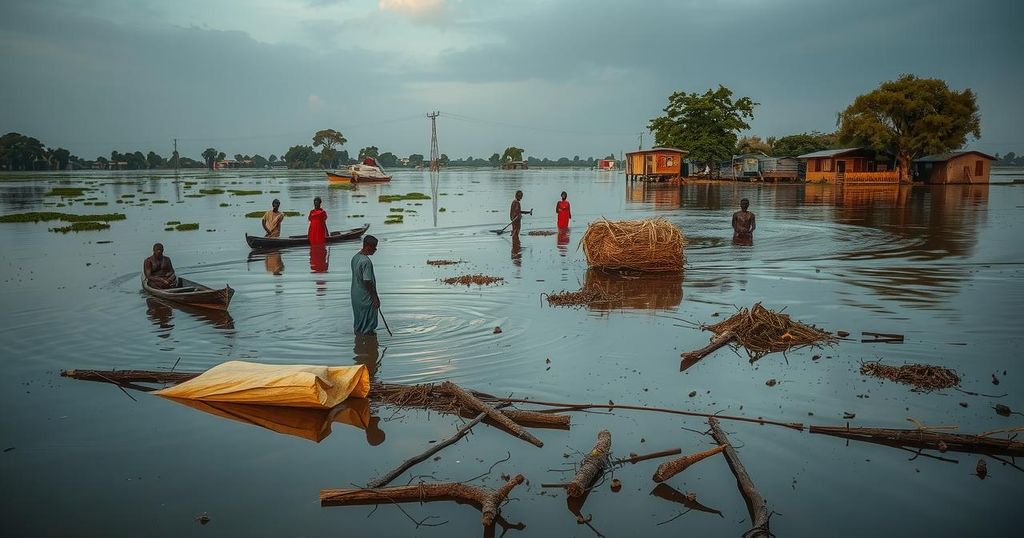Climate change
ABYEI, AFRICA, ANI, CENTRAL EQUATORIA, DISASTER MANAGEMENT, FLOOD, FLOODS, HUMANITARIAN AID, INTER, INTERNALLY DISPLACED PERSONS (IDPS, INTERNATIONAL FEDERATION OF RED CROSS, JUBA COUNTY, MONSOON, OCHA, SUDAN, UN ICEF, UNITED NATIONS, UNITED NATIONS OFFICE FOR THE COORDINATION OF HUMANITARIAN AFFAIRS
Isaac Bennett
0 Comments
South Sudan Floods Displace Over 300,000 Amidst Malaria Surge: UN Report
Flooding in South Sudan has displaced over 3,00,000 people and affected approximately 1.4 million as per the United Nations. Jonglei and Northern Bahr el Ghazal states are the worst hit, with a surge in malaria cases further complicating the health crisis. Urgent humanitarian responses are required to address the impacts of this disaster.
Flooding in South Sudan has severely impacted the lives of many, with over 3,00,000 individuals displaced and approximately 1.4 million affected overall. The United Nations Office for the Coordination of Humanitarian Affairs (OCHA) reported large-scale damages across 43 counties and the Abyei Administrative Area, particularly in Jonglei and Northern Bahr el Ghazal states, which have been hit hardest. The situation is further exacerbated by a significant increase in malaria cases, overwhelming the local health systems in these regions. In a detailed report, OCHA outlined that “About 1.4 million people are affected by flooding in 43 counties and the Abyei Administrative Area, with Jonglei and Northern Bahr el Ghazal states comprising more than 51 percent of the affected population. Over 3,79,000 individuals are displaced in 22 counties and Abyei.” Recent assessments identified additional flood-displaced individuals, highlighting the acute humanitarian crisis. The International Federation of Red Cross has indicated that the flooding in South Sudan, which has persisted since May 2024, is a result of heavy rainfall and the Nile River overflow. The impact has been devastating, destroying homes and displacing livestock while causing significant crop damage. Furthermore, the increased frequency and intensity of these floods can be attributed to climate change, warranting urgent attention.
The flooding in South Sudan is a recurrent humanitarian crisis influenced by severe weather conditions and climate change. Since May 2024, the country has seen a surge in flooding due to excessive rainfall and overflowing riverbanks, particularly along the Nile River. This phenomenon has led to significant displacement, economic hardship, and health crises, particularly the increased incidences of malaria. The ongoing flooding has been a part of a larger trend, with the UNICEF estimating that annually, between 750,000 and over one million individuals are affected by such disasters. The country’s challenging geographical and climatic conditions necessitate comprehensive interventions to address both immediate relief needs and long-term strategies for resilience against natural disasters. The vulnerabilities of affected populations are compounded by existing socioeconomic challenges, making response efforts critical. Humanitarian organizations continue to monitor and address the repercussions of this crisis, emphasizing the need for robust interventions to mitigate the impacts of floods and improve health outcomes in the region.
In conclusion, South Sudan is facing a critical humanitarian crisis due to unprecedented flooding, resulting in widespread displacement and health complications, particularly from malaria. With over 1.4 million people impacted and a significant portion of the population displaced, the need for urgent humanitarian assistance is evident. This situation highlights the broader implications of climate change in the region, necessitating a coordinated and sustained response to both immediate needs and long-term resilience efforts.
Original Source: www.aninews.in




Post Comment